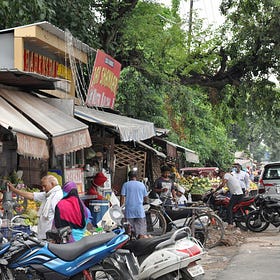Fallout of bad regulation
Everyone says bad regulation creates hurdles in economic growth. Here is one example how.
You can picture this. There are many street vendors selling everything from clothes, bags, vegetables, food, drinks, books, electronics and knick-knacks. They have encroached on the footpath. You do not have space to walk. There are people haggling with these vendors. Yes, of course, there is a demand for those goods.
But just behind them, there are shops - proper airconditioned shops and not many customers in there. Why don’t those shops not sell these fast moving items? The reason is regulation.
The Restaurant Case
While researching for a legal case of a restauranteur, I learnt that
It takes 40+ licences to start a restaurant in Mumbai. And all of these need to be updated - some monthly, some six-monthly, some annually, some at random time intervals.
Around 12 different inspectors/officers conduct visit of the restaurant.
450+ times he is interacting with some official or other during the year, filing forms, inspection, certificate grant, getting copy of the certificate, etc.
The process is smoothened by bribes.
Yet, many officers are antagonistic, treating the restauranteur as a criminal at the very outset. Others are pragmatic and state their “demands” upfront.
The food-stall right outside the restaurant simply pays one bribe a day. His process is smooth and officers are friendly. Yes, sometimes they raid these stalls, break them and cause losses but they often give advance notice of such raids.
Regulation makes it tough to do business legally.
What I described about the restaurant business is true of all stalls vs legal shops. This is the problem with current regulation. This brings us to the current reality in India:
Cost of complying with the law is HIGH & benefits are LOW
AND
Cost of breaking the law is LOW & benefits are HIGH
The central government and some states have tried to ease this but city-level governance is still colonial. It proceeds with the assumption that the citizens are cheaters and culprits. This assumption was seeded by the British colonial power that wrote these laws. It was incumbent on the free-India’s state machinery to recolonise the laws and institutions. Something it has failed to do as yet.
The people’s response to such an extractive state has been to subvert it. I explained it in this post.
Encroachments and corruption
In a case before the Bombay High Court, the judges were passionately reprimanding the anti-encroachment department of the Mumbai Municipal Corporation for inaction against encroachments. The Court was then shown pictures of encroachments right outside the office of anti-encroachment department.
It is time to de-regulate intelligently!
It is now critical that we de-regulate. Compliance of law should be easy. We need to trust the citizens to do the right thing.
But it should not mean there is no oversight. Oversight should be benign. It should be driven from place of care not from a need to control. There is a BIG difference in those two attitudes.
If you like this post please share it with others using the button below.
I, or RightVIEWS, will not solicit any money from you.




